
Volume XIII, Issue IX
Apollonius
By Bob Kirchman
Copyright © 2017, The Kirchman Studio, all rights reserved
Chapter 3: Major Cohen
Not surprisingly, the hand-picked crew was Israeli. The first mate was Major Sarah Cohen, who had been in service with Ben Gurion before. Ben Gurion made it clear that the Major was his first choice for the position and that without her selection, he was not interested in the command. In simulator flight practice you could see the crisp performance of the two veteran flyers as they worked together. In fact, no one would suspect the great secret they had in common… they were husband and wife! They had stood under a chuppah by the Sea of Galilee with a few friends who were sworn to secrecy. When Abiyah’s crew was finalized, you must know that the bulk of his crew were secret couples as well. Since the crew’s quarters were in a sealed off area near the lift to the bridge, this would not present a problem… unless Apollonius insisted on occupying the crew’s quarters as well. Fortunately he could not resist the offer of the more luxurious VIP quarters in another sector and so as far as he knew he simply had the best flying team in Israel handling his starship.
In fact, the crew were pretty much unopposed by any serious competition for their assignment. A few reckless adventurers and such vied for the positions but Ben Gurion’s little group outperformed them all. They occupied the Great Northern as simulated flight situations were run through her cockpit… practicing over and over for the journey to Mars. Most of them had enjoyed remarkable careers in the IAF and this two-year mission would be a wonderful transition into civilian retirement. Sarah Cohen was young and ambitious, but she wanted a legacy most of all. Retirement might be difficult for Abiyah, if not downright impossible, but they both dreamed of children. That would have to wait until they were safely back on Earth.
Apollonius makes me nervous.” Sarah confided to her husband. “He seems to have more than colonization on his mind. Trust me, I can sense it.”
We’ll have him on our backs for less than a year, then we’ll coast home. We’ve been in tighter places before. The Divine is our Hope and Protector.”
You read PSALMS a lot, husband. I am glad they give you hope and comfort, but this Apollonius… I think we all underestimate him, ESPECIALLY Rupert Zimmerman. That may just prove to be our undoing.”
In Wales, AK, at the headquarters of the Zimmerman organization, a similar conversation was ongoing between Elizabeth Zimmerman O’Malley and Rupert’s assistant Hannah.
The numbers all add up, Hannah, but I just don’t see something here and I can feel that I don’t see something!”
I know.” Hannah replied. “Its like Rupert forgets to ask the really tough questions. Usually he’s the one to ferret it out when there is something not quite right. But, as you say, the numbers make sense and the use of SS/AC006 virtually eliminates the unknowns as far as risk. So far as the mission itself, It’s textbook except that we weren’t going to do a MANNED mission and no one saw any benefit to colonization. We sell space on linear induction launches all the time. The people going out to the colony are volunteers and we’ve kept the process rigorous so they have plenty of time to rethink. The crew flying Great Northern is the best we have… and loyal to a fault. Apollonius himself, well, he’s one smooth operator and he seems to deftly answer any questions. But there its like he’s TOO scripted… TOO ready with the explanation. Do you know what I mean?”
I know. Really, it’s his connection to the One World Government Movement that troubles me the most. AAR and Israel will get the credit for the mission all right, but is he pushing something else that we can’t see here that will further his statist designs?”
He’s out of the picture until he returns for the launch.” said Elizabeth. “In the meantime, I will work with Mr. Zimmerman to assure we have the proper oversight in place for the mission.”
(to be continued)
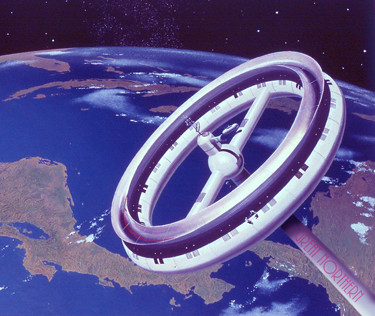
Around the World in 80 Days
By Jules Verne, Chapter VII
Which Once More Demonstrates the Uselessness of Passports as Aids to Detectives
The detective passed down the quay, and rapidly made his way to the consul’s office, where he was at once admitted to the presence of that official.
Consul,” said he, without preamble, “I have strong reasons for believing that my man is a passenger on the Mongolia.” And he narrated what had just passed concerning the passport.
Well, Mr. Fix,” replied the consul, “I shall not be sorry to see the rascal’s face; but perhaps he won’t come here — that is, if he is the person you suppose him to be. A robber doesn’t quite like to leave traces of his flight behind him; and, besides, he is not obliged to have his passport countersigned.”
If he is as shrewd as I think he is, consul, he will come.”
To have his passport visaed?”
Yes. Passports are only good for annoying honest folks, and aiding in the flight of rogues. I assure you it will be quite the thing for him to do; but I hope you will not visa the passport.”
Why not? If the passport is genuine I have no right to refuse.”
Still, I must keep this man here until I can get a warrant to arrest him from London.”
Ah, that’s your look-out. But I cannot —”
The consul did not finish his sentence, for as he spoke a knock was heard at the door, and two strangers entered, one of whom was the servant whom Fix had met on the quay. The other, who was his master, held out his passport with the request that the consul would do him the favour to visa it. The consul took the document and carefully read it, whilst Fix observed, or rather devoured, the stranger with his eyes from a corner of the room.
You are Mr. Phileas Fogg?” said the consul, after reading the passport.
I am.”
And this man is your servant?”
He is: a Frenchman, named Passepartout.”
You are from London?”
Yes.”
And you are going —”
To Bombay.”
Very good, sir. You know that a visa is useless, and that no passport is required?”
I know it, sir,” replied Phileas Fogg; “but I wish to prove, by your visa, that I came by Suez.”
Very well, sir.”
The consul proceeded to sign and date the passport, after which he added his official seal. Mr. Fogg paid the customary fee, coldly bowed, and went out, followed by his servant.
Well?” queried the detective.
Well, he looks and acts like a perfectly honest man,” replied the consul.
Possibly; but that is not the question. Do you think, consul, that this phelgmatic gentleman resembles, feature by feature, the robber whose description I have received?”
I concede that; but then, you know, all descriptions —”
I’ll make certain of it,” interrupted Fix. “The servant seems to me less mysterious than the master; besides, he’s a Frenchman, and can’t help talking. Excuse me for a little while, consul.”
Fix started off in search of Passepartout.
Meanwhile Mr. Fogg, after leaving the consulate, repaired to the quay, gave some orders to Passepartout, went off to the Mongolia in a boat, and descended to his cabin. He took up his note-book, which contained the following memoranda:
Left London, Wednesday, October 2nd, at 8.45 p.m. “Reached Paris, Thursday, October 3rd, at 7.20 a.m. “Left Paris, Thursday, at 8.40 a.m. “Reached Turin by Mont Cenis, Friday, October 4th, at 6.35 a.m. “Left Turin, Friday, at 7.20 a.m. “Arrived at Brindisi, Saturday, October 5th, at 4 p.m. “Sailed on the Mongolia, Saturday, at 5 p.m. “Reached Suez, Wednesday, October 9th, at 11 a.m. “Total of hours spent, 158+; or, in days, six days and a half.”
These dates were inscribed in an itinerary divided into columns, indicating the month, the day of the month, and the day for the stipulated and actual arrivals at each principal point Paris, Brindisi, Suez, Bombay, Calcutta, Singapore, Hong Kong, Yokohama, San Francisco, New York, and London — from the 2nd of October to the 21st of December; and giving a space for setting down the gain made or the loss suffered on arrival at each locality. This methodical record thus contained an account of everything needed, and Mr. Fogg always knew whether he was behind-hand or in advance of his time. On this Friday, October 9th, he noted his arrival at Suez, and observed that he had as yet neither gained nor lost. He sat down quietly to breakfast in his cabin, never once thinking of inspecting the town, being one of those Englishmen who are wont to see foreign countries through the eyes of their domestics.
(to be continued)
Around the World in 80 Days
By Jules Verne, Chapter VIII
In which Passepartout Talks Rather More, Perhaps, than is Prudent
Fix soon rejoined Passepartout, who was lounging and looking about on the quay, as if he did not feel that he, at least, was obliged not to see anything.
Well, my friend,” said the detective, coming up with him, “is your passport visaed?”
Ah, it’s you, is it, monsieur?” responded Passepartout. “Thanks, yes, the passport is all right.”
And you are looking about you?”
Yes; but we travel so fast that I seem to be journeying in a dream. So this is Suez?”
Yes.”
In Egypt?”
Certainly, in Egypt.”
And in Africa?”
In Africa.”
In Africa!” repeated Passepartout. “Just think, monsieur, I had no idea that we should go farther than Paris; and all that I saw of Paris was between twenty minutes past seven and twenty minutes before nine in the morning, between the Northern and the Lyons stations, through the windows of a car, and in a driving rain! How I regret not having seen once more Pere la Chaise and the circus in the Champs Elysees!”
You are in a great hurry, then?”
I am not, but my master is. By the way, I must buy some shoes and shirts. We came away without trunks, only with a carpet-bag.”
I will show you an excellent shop for getting what you want.”
Really, monsieur, you are very kind.”
And they walked off together, Passepartout chatting volubly as they went along.
Above all,” said he; “don’t let me lose the steamer.”
You have plenty of time; it’s only twelve o’clock.”
Passepartout pulled out his big watch. “Twelve!” he exclaimed; “why, it’s only eight minutes before ten.”
Your watch is slow.”
My watch? A family watch, monsieur, which has come down from my great-grandfather! It doesn’t vary five minutes in the year. It’s a perfect chronometer, look you.”
I see how it is,” said Fix. “You have kept London time, which is two hours behind that of Suez. You ought to regulate your watch at noon in each country.”
I regulate my watch? Never!”
Well, then, it will not agree with the sun.”
So much the worse for the sun, monsieur. The sun will be wrong, then!”
And the worthy fellow returned the watch to its fob with a defiant gesture. After a few minutes silence, Fix resumed: “You left London hastily, then?”
I rather think so! Last Friday at eight o’clock in the evening, Monsieur Fogg came home from his club, and three-quarters of an hour afterwards we were off.”
But where is your master going?”
Always straight ahead. He is going round the world.”
Round the world?” cried Fix.
Yes, and in eighty days! He says it is on a wager; but, between us, I don’t believe a word of it. That wouldn’t be common sense. There’s something else in the wind.”
Ah! Mr. Fogg is a character, is he?”
I should say he was.”
Is he rich?”
No doubt, for he is carrying an enormous sum in brand new banknotes with him. And he doesn’t spare the money on the way, either: he has offered a large reward to the engineer of the Mongolia if he gets us to Bombay well in advance of time.”
And you have known your master a long time?”
Why, no; I entered his service the very day we left London.”
The effect of these replies upon the already suspicious and excited detective may be imagined. The hasty departure from London soon after the robbery; the large sum carried by Mr. Fogg; his eagerness to reach distant countries; the pretext of an eccentric and foolhardy bet — all confirmed Fix in his theory. He continued to pump poor Passepartout, and learned that he really knew little or nothing of his master, who lived a solitary existence in London, was said to be rich, though no one knew whence came his riches, and was mysterious and impenetrable in his affairs and habits. Fix felt sure that Phileas Fogg would not land at Suez, but was really going on to Bombay.
Is Bombay far from here?” asked Passepartout.
Pretty far. It is a ten days’ voyage by sea.”
And in what country is Bombay?”
India.”
In Asia?”
Certainly.”
The deuce! I was going to tell you there’s one thing that worries me — my burner!”
What burner?”
My gas-burner, which I forgot to turn off, and which is at this moment burning at my expense. I have calculated, monsieur, that I lose two shillings every four and twenty hours, exactly sixpense more than I earn; and you will understand that the longer our journey —”
Did Fix pay any attention to Passepartout’s trouble about the gas? It is not probable. He was not listening, but was cogitating a project. Passepartout and he had now reached the shop, where Fix left his companion to make his purchases, after recommending him not to miss the steamer, and hurried back to the consulate. Now that he was fully convinced, Fix had quite recovered his equanimity.
Consul,” said he, “I have no longer any doubt. I have spotted my man. He passes himself off as an odd stick who is going round the world in eighty days.”
Then he’s a sharp fellow,” returned the consul, “and counts on returning to London after putting the police of the two countries off his track.”
We’ll see about that,” replied Fix.
But are you not mistaken?”
I am not mistaken.”
Why was this robber so anxious to prove, by the visa, that he had passed through Suez?”
Why? I have no idea; but listen to me.”
He reported in a few words the most important parts of his conversation with Passepartout.
In short,” said the consul, “appearances are wholly against this man. And what are you going to do?”
Send a dispatch to London for a warrant of arrest to be dispatched instantly to Bombay, take passage on board the Mongolia, follow my rogue to India, and there, on English ground, arrest him politely, with my warrant in my hand, and my hand on his shoulder.”
Having uttered these words with a cool, careless air, the detective took leave of the consul, and repaired to the telegraph office, whence he sent the dispatch which we have seen to the London police office. A quarter of an hour later found Fix, with a small bag in his hand, proceeding on board the Mongolia; and, ere many moments longer, the noble steamer rode out at full steam upon the waters of the Red Sea.
(to be continued)
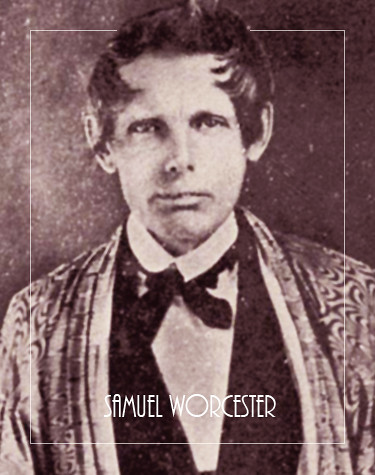
Samuel Worcester. Archives of the State of Georgia.
Samuel Worcester
A Life of Service and Sacrifice
In 1828 the Reverend Samuel A. Worcester built his home among the Cherokee at New Echota. Working with Elias Boudinot, Worcester translated parts of the Bible and many hymns into Cherokee. The press at New Echota which also produced the Phoenix printed many of these works. Worcester planted a church at New Echota and also started a school. He served as the town’s postmaster.
As the state of Georgia passed laws that were oppressive to the Cherokee Nation, Worcester refused to obtain the permit the state required for a white person to live in the Cherokee lands. In 1831 he was arrested and sent to prison by Georgia officials.
His case was appealed to the United States Supreme Court. In Worcester v. Georgia, Worcester and the Cherokees won. The state of Georgia, however, continued to annex Cherokee land. In 1832 Worcester and his family were forced from the house when a white Georgian obtained title to it in the 1832 land lottery conducted by the state.
Samuel Worcester moved to Oklahoma where he continued to serve and advocate for the Cherokee Nation. As the town of New Echota disappeared and became farmland, his house continued in use by different families until 1958 when it was restored as a historic home.

The restored home of Samuel Worcester in New Echota. Photo by Bob Kirchman.
The Varsity
Atlanta’s Horatio Alger Drive-In Story
In 1926, so the story goes, Frank Gordy was a freshman at Georgia Tech in Atlanta, Georgia. A professor supposedly told him to leave school because “he was too dumb to cook a hot dog.” Gordy dropped out in 1926, telling his friends he’d be worth $20,000 by the time the rest of them graduated. He transferred to Oglethorpe University for a semester and tried his hand at real estate.
The next fall, he acquired a small lot on Atlanta’s Lucky Avenue, near the Georgia Tech campus and built his hot dog stand. He planned to take advantage of the student market but also set his sights on the newly mobile population who owned automobiles. In the 1940’s the present building was constructed. When the Interstate was built through Atlanta it took part of Frank’s parking lot so he built a parking deck and more dining space bridged over the remaining lot. The result, it looks like a Sonic on steroids, sells more Coca-Cola products than any other location of its type and made Frank Gordy a very successful person.
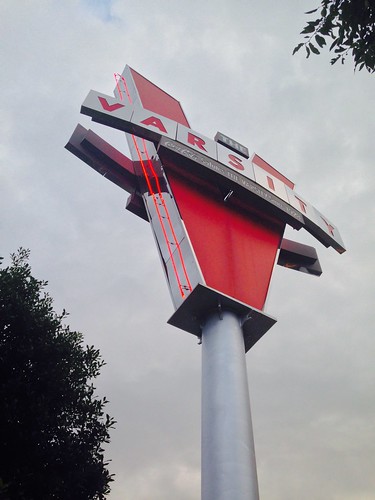
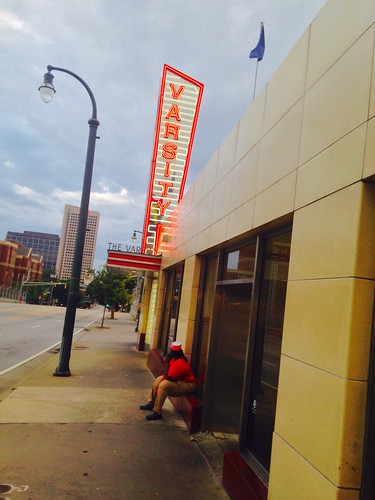
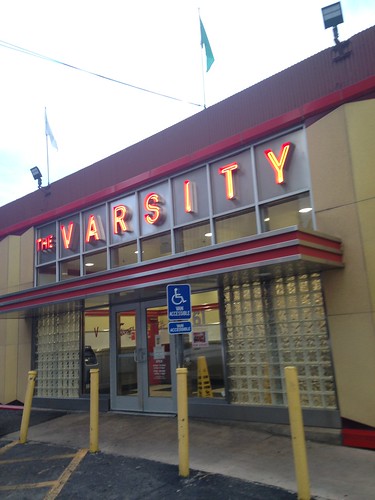
The Varsity Drive-In. Photos by Bob Kirchman.
AIBD Conference in Atlanta
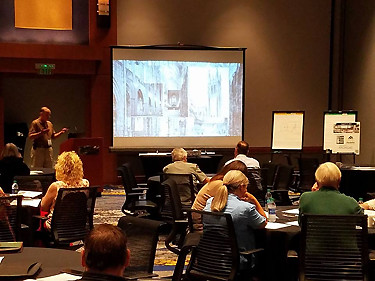
Here I am presenting 'The Art of Design Communication' at the American Institute of Building Design Summer Conference in Atlanta, Georgia. At this moment we are examining the beautiful rendering style of Architect Julian Abele.
AIBD Photo.
In the Nineteenth Century, the German poet Heinrich Heine studied the Gothic Cathedrals of France, England and Germany. A friend asked him, “Why can we no longer build such majestic structures?” Heine answered, “In those days, men had convictions, whereas we moderns only have opinions, and something more is needed than an opinion to build a Gothic cathedral.” In our workshop we studied the drawings of Julian Abele, [1.] who did create such majestic structures in the Twentieth Century.
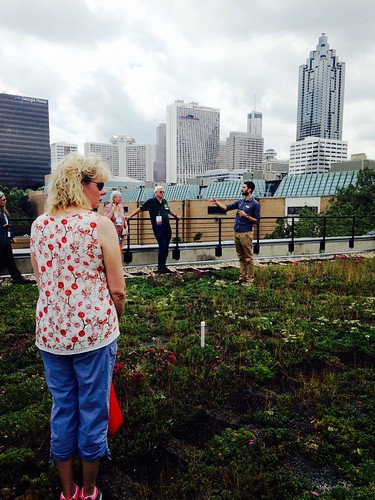
Modern Atlanta towers above a green roofed building.
Photo by Bob Kirchman.
Texas Grocer Helps Harvey Victims
[click to read]
ht/M. K. Hand
H-E-B, Texas' largest grocery chain responds to hurricane Harvey by rolling out a disaster relief convoy. According to H-E-B, the convoy includes fifteen vehicles, including two mobile kitchens, water and fuel tankers, portable generators, emergency grocery supplies and equipment.
H‑E‑B's DRUs (Disaster Relief Units) are fully equipped with an H‑E‑B Pharmacy and mobile Business Services unit, which allows displaced residents to fill prescriptions, cash checks and pay bills, as well as provide access to an ATM. The H‑E‑B Mobile Kitchens, two 45‑foot‑long food preparation facilities that are each designed to serve up to 2,500 meals per hour, will set up and serve hot meals to first responders and storm victims.
In addition, H-E-B dispatched a team of 100 employees to help assist in helping folks that have been impacted by the storm. HEB will be providing dry-ice, bottled water, dry-goods, and medicine. One of the mobile units includes a mobile pharmacy.
The convoy was dispatched to Victoria, Texas and staged at the HEB store at 1505 E. Rio Grande, Victoria, Texas. Another journalist, NBC5's Brian Curtis posted a video on Facebook showing the convoy on the side of the road preparing to deploy. (read more)
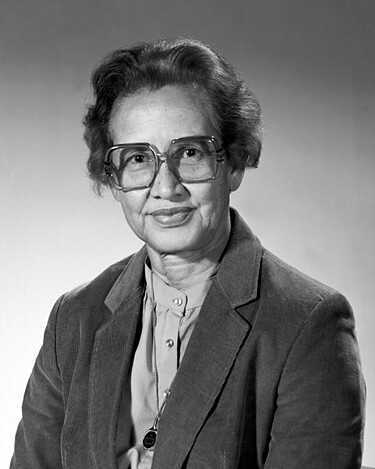
Dr. Katherine Johnson, shown in this 1983 NASA photograph, calculated the paths of Mercury, Gemini and Apollo Astronauts. This past Friday she celebrated her 99th birthday.
NASA Photograph.
Hidden Figures
The Story of An Amazing Collaboration
Margot Lee Shetterly’s amazing book, Hidden Figures, tells the story of the women who made modern aviation and the space program possible. While the astronauts lived in the public eye, NASA was actually a work of epic proportions involving thousands of individuals from every conceivable background and from all parts of the world. If the nations were thwarted in the building of Biblical Babel – a tower to the heavens, by scattering, NASA actually did just the opposite in assembling the best minds to build a rocket.
The story follows the black women of Langley’s West Computing Division most closely, but Shetterly tells us of Doris Cohen as well, who published An Analysis of the Stability of an Airplane with Free Controls with Robert T. Jones in 1941. My fictional Sarah Cohen is indeed a tribute to her. My father worked for NASA in the 1960’s and the first person from the Middle-East that I ever met was a Turkish engineer who was his colleague. Though NASA did indeed seem like a bunch of white guys with white shirts and narrow ties, the agency went for the best talent where it needed it. That brought them the world.
The story is also that of all this amazing collaboration taking place in the midst of Byrd Machine Virginia and Massive Resistance. Even if you yawn at the thought of reading about engineers, the Civil Rights history alone is important in itself. The takeaway is remembering the very real grief that black people had to put up with in the days of my childhood. During those turbulent days, Shetterly recounts, the fictional program Star Trek was first produced. Nichelle Nichols played Nyota Uhura, the communications officer of the Starship Enterprise. She was ready to quit after the first season and handed her resignation letter to Gene Roddenberry, the show’s producer. Roddenberry told her to think about it over the weekend.
She was away at a conference of some sort that weekend when someone said that they wanted to introduce her to her greatest fan – it turned out to be Dr. Martin Luther King Jr. When she told him she was quitting, he begged her not to. For Dr. King, her character was indeed ‘living the dream.’ He convinced her that she was indeed an inspiration to young people and she remained on the program.
